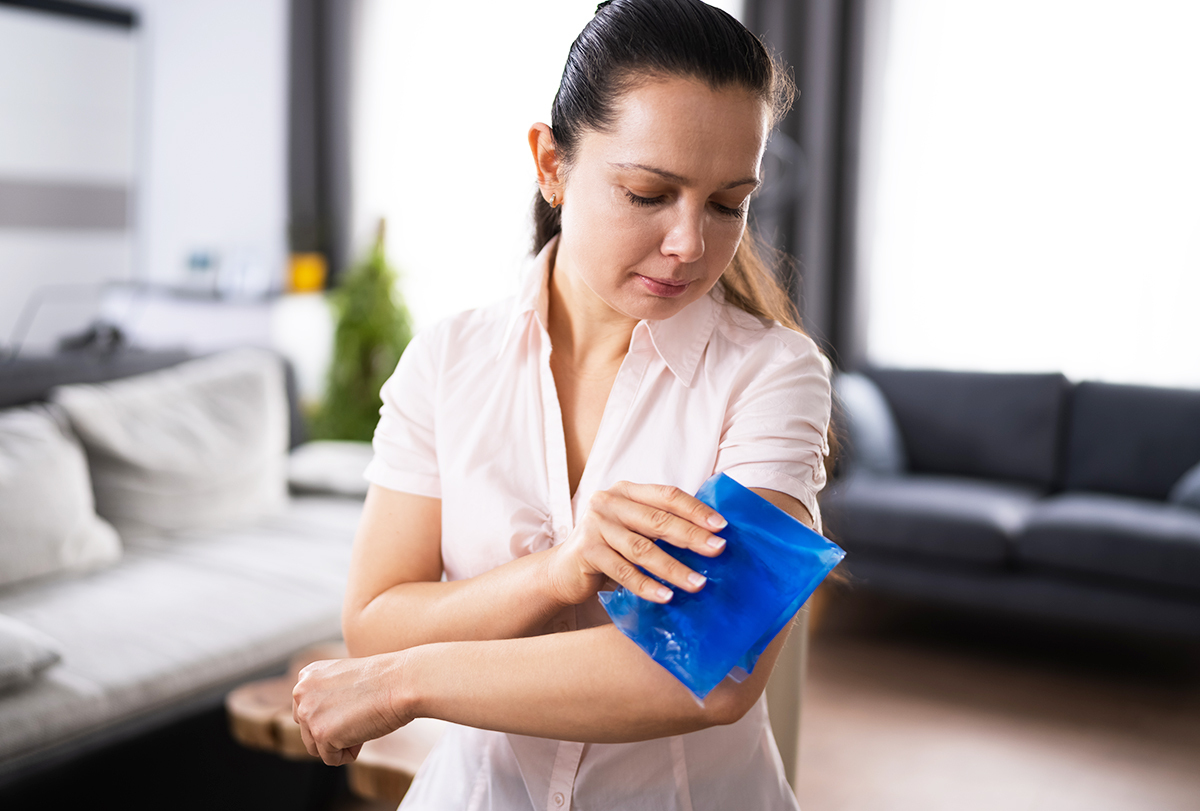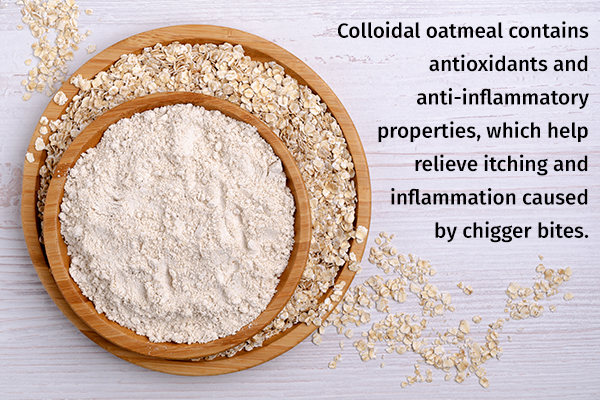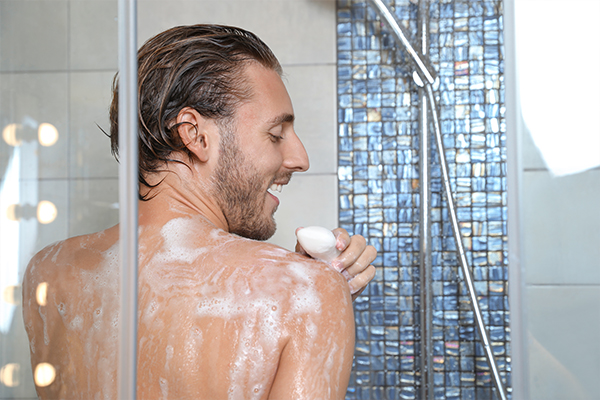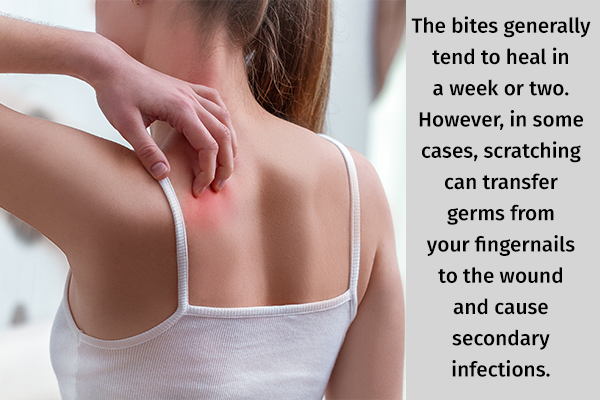In this article:
Summers are synonymous with camping, ice creams, beaches – and annoying insect bites. Although mosquitos get a particularly bad rep in this department, chiggers do not lag far behind.

Chiggers are tiny red mites found in grassy areas such as forests, fields, or near water bodies. They are active year-round but are most commonly noticed in the summer, mainly because more people indulge in outdoor activities during these months.
Chigger bites are caused by chigger larvae (1) rather than the adult mites. They are characterized by an inflammatory reaction at the affected area of the skin, which manifests in the form of severe itching, irritation, and redness.
These bites mostly occur on sweaty or warm skin folds such as the armpits, groin, and behind the knees.
Home Remedies for Chigger Bites
Chigger bites may be a nuisance but are typically not infectious and can easily be treated at home. Here are a few simple remedies to treat them:
1. Apply a cold compress
Cold compresses can provide temporary relief from itching and skin irritation caused by chigger bites.
Topical cooling constricts the underlying blood vessels to reduce blood flow and thereby numb the nerve endings in the area. This helps relieve swelling and lessen the discomfort. However, the soothing effect only lasts for a short period. (2)
How to use:
- Fill a Ziploc bag with ice cubes and seal it shut.
- Wrap a clean towel or cloth around the bag.
- Place this cold compress over your irritated skin for at least 10–15 minutes.
Note: Never put ice or an ice pack directly on the skin as the extreme cold can damage the underlying tissue and even cause frostbite.
2. Try colloidal oatmeal

Colloidal oatmeal is a rich source of avenanthramides, which are natural substances that contain several antioxidants and anti-inflammatory properties. They have widespread use in dermatology and help relieve itching and inflammation caused by insect bites.
How to use:
- Grind 1½ cup of oats to a fine powder. (3)
- Fill a bathtub with lukewarm water and add the oatmeal powder to it. Mix the water with your hands till the powder dissolves.
- Bathe in this water for at least half an hour.
3. Take an Epsom salt bath
Epsom salt is made up of magnesium and sulfate. Magnesium is a natural moisturizer and has anti-inflammatory qualities. (4) It can significantly help reduce swelling, itching, and irritation caused by chigger bites.
How to use:
- Fill a bathtub with water.
- Add 1 cup of Epsom salt to the water.
- Soak in this relaxing bath for at least half an hour for best results.
Self-Care Measures to Manage and Prevent Chigger Bites

Observing the following measures can help prevent and manage chigger bites:
1. Protect yourself when visiting chigger-infested areas
Always wear long-sleeved clothes and long pants when you go to places that might be breeding grounds for chiggers – such as forests and grasslands. Remember to take extra precautions during spring and summer as chiggers tend to be most active during these months.
2. Apply bug repellent
Bug repellents containing DEET or permethrin are effective in reducing insect bites. It can be helpful to spray some on your shoes and clothes before going near grassy areas or woods. (5)
However, many bug repellents can be toxic to human beings; hence, it is important to take certain precautions when using them:
- Do not spray bug repellents indoors. Always use them in an open area to avoid accidental inhalation.
- Remove any clothing that has been sprayed with repellent as soon as you return indoors. Make sure to wash them thoroughly before reusing.
- Avoid spraying any bug repellent directly onto your skin.
3. Wash your clothes
Change your clothes as soon as you return home from any place that may be a hotbed of chiggers. Wash your clothes with hot water and detergent before wearing them again.
4. Take a shower with soap and water
If you feel you have been bitten by chiggers, take a shower with soap and normal-temperature or cold water as soon as you can. This may help reduce your skin irritation and get rid of any chiggers on your body.
5. Avoid scratching
Chigger bites can trigger a severe itch, but scratching it will only make matters worse. Scratching gives you momentary relief, but then the itch comes back with greater intensity. This leads to a cycle of itching and scratching.
The incessant rubbing of your sharp nails can end up damaging or rupturing the skin barrier. Plus, you may end up transferring germs to the affected site that will enter through the skin tear to trigger an infection.
This is why it is very important to resist the urge to scratch and look for other ways to minimize the itch caused by chigger bites.
How Long Do Chigger Bites Last?

Chigger bites can cause extreme itching and discomfort but usually do not cause further harm. The bites generally tend to heal in a week or two. However, in some cases, scratching can transfer germs from your fingernails to the wound and cause secondary infections.
Keep your fingernails short and clean to avoid damaging and infecting the irritated skin.
Final Word
The best way to avoid insect bites is to stay away from vegetation. Since this is not always possible, take the necessary steps to make yourself an unappealing target to insects. Wear long-sleeved clothes, use insect repellent, and shower as soon as you are indoors.

- Was this article helpful?
- YES, THANKS!NOT REALLY


